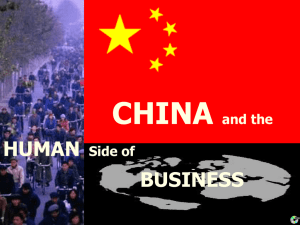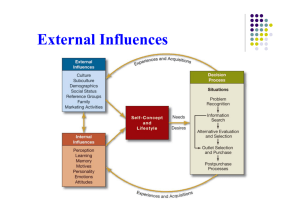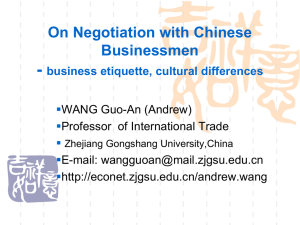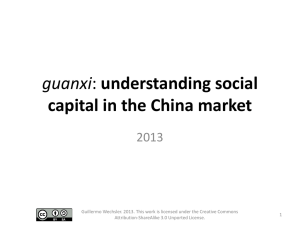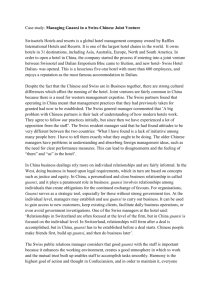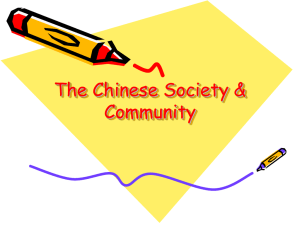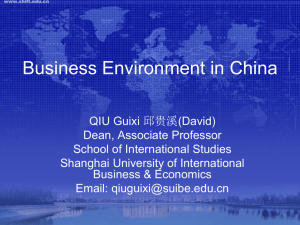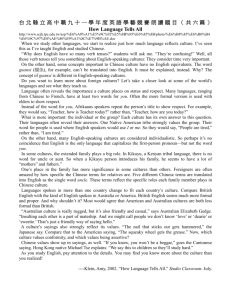Chinese Guanxi
advertisement
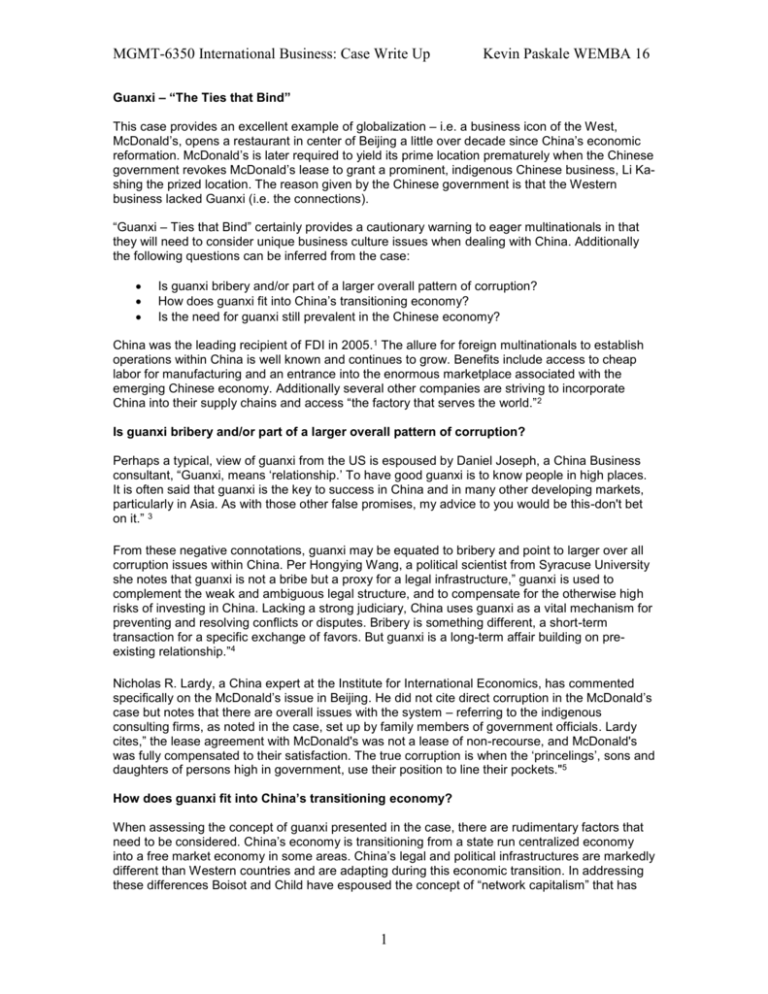
MGMT-6350 International Business: Case Write Up Kevin Paskale WEMBA 16 Guanxi – “The Ties that Bind” This case provides an excellent example of globalization – i.e. a business icon of the West, McDonald’s, opens a restaurant in center of Beijing a little over decade since China’s economic reformation. McDonald’s is later required to yield its prime location prematurely when the Chinese government revokes McDonald’s lease to grant a prominent, indigenous Chinese business, Li Kashing the prized location. The reason given by the Chinese government is that the Western business lacked Guanxi (i.e. the connections). “Guanxi – Ties that Bind” certainly provides a cautionary warning to eager multinationals in that they will need to consider unique business culture issues when dealing with China. Additionally the following questions can be inferred from the case: Is guanxi bribery and/or part of a larger overall pattern of corruption? How does guanxi fit into China’s transitioning economy? Is the need for guanxi still prevalent in the Chinese economy? China was the leading recipient of FDI in 2005.1 The allure for foreign multinationals to establish operations within China is well known and continues to grow. Benefits include access to cheap labor for manufacturing and an entrance into the enormous marketplace associated with the emerging Chinese economy. Additionally several other companies are striving to incorporate China into their supply chains and access “the factory that serves the world.”2 Is guanxi bribery and/or part of a larger overall pattern of corruption? Perhaps a typical, view of guanxi from the US is espoused by Daniel Joseph, a China Business consultant, “Guanxi, means ‘relationship.’ To have good guanxi is to know people in high places. It is often said that guanxi is the key to success in China and in many other developing markets, particularly in Asia. As with those other false promises, my advice to you would be this-don't bet on it.” 3 From these negative connotations, guanxi may be equated to bribery and point to larger over all corruption issues within China. Per Hongying Wang, a political scientist from Syracuse University she notes that guanxi is not a bribe but a proxy for a legal infrastructure,” guanxi is used to complement the weak and ambiguous legal structure, and to compensate for the otherwise high risks of investing in China. Lacking a strong judiciary, China uses guanxi as a vital mechanism for preventing and resolving conflicts or disputes. Bribery is something different, a short-term transaction for a specific exchange of favors. But guanxi is a long-term affair building on preexisting relationship.”4 Nicholas R. Lardy, a China expert at the Institute for International Economics, has commented specifically on the McDonald’s issue in Beijing. He did not cite direct corruption in the McDonald’s case but notes that there are overall issues with the system – referring to the indigenous consulting firms, as noted in the case, set up by family members of government officials. Lardy cites,” the lease agreement with McDonald's was not a lease of non-recourse, and McDonald's was fully compensated to their satisfaction. The true corruption is when the ‘princelings’, sons and daughters of persons high in government, use their position to line their pockets."5 How does guanxi fit into China’s transitioning economy? When assessing the concept of guanxi presented in the case, there are rudimentary factors that need to be considered. China’s economy is transitioning from a state run centralized economy into a free market economy in some areas. China’s legal and political infrastructures are markedly different than Western countries and are adapting during this economic transition. In addressing these differences Boisot and Child have espoused the concept of “network capitalism” that has 1 MGMT-6350 International Business: Case Write Up Kevin Paskale WEMBA 16 emerged since the economic reform of 1979, “China's rapid economic development is being accomplished through a system of industrial governance and transaction that differs from Western experience. A study identifies the broad institutional nature of this distinctiveness within a framework of information codification and diffusion. The limited extent of codification of information in China and its communal property rights and organization of economic transactions suggest that decentralization from the former state-command system is giving rise to a distinctive institutional form - network capitalism.”6 The evolution of China’s economy has been cited to be most different than that of other countries,” Western models of economic development cannot be relied upon to explain China's emerging economic system. In contrast to Western capitalist systems, in which the government monitors economic activity through externally imposed rules and sanctions, the Chinese system integrates governmental authority with economic activity. The interdependence between government and economic enterprises has led to a uniquely Chinese form of capitalism that Boisot and Child call ‘network capitalism.’ Western firms may feel more comfortable negotiating ventures through formal structures, but Chinese investors may be more likely to pursue business ventures through interpersonal relationships and informal transactions.” 7 As noted in the case, guanxi emanates from Confucian philosophy and has been part of the Chinese culture for thousands of years. Conceivably the network capitalism theory supports the continued need for Guanxi Is the need for guanxi still prevalent in the Chinese economy? Per several sources, the need for guanxi still exists due to the current transition still occurring within China’s economy, “Others (Yanjie Bian and Pitman Potter) insist that guanxi still exerts great influence, and such influence may be on the rise because of the institutional holes created by the abandonment of the old state mechanisms (e.g., the job-allocation system) and the immaturity of new market and legal mechanisms. Potter regards guanxi as a complement to the legal system in China.”8 Daniel Joseph, previously cited, concurs that guanxi still exists due to transitory effects in China’s economy – particularly in cases where the government is involved,”Whenever doing business in any overseas market, your first question should be: Is it a free market economy or a statecontrolled economy? The answer, in China's case, is both. China is a state-controlled economy that is becoming freer. Furthermore, at any given point in time, some segments of the economy are freer than other segments, which means that in some segments of the economy, relationships are more important than in others. In other words, the importance of guanxi is related to the degree of freedom of your market segment. The freer your market (i.e., your competitors and customers are mostly private companies, as opposed to state-owned companies), the less important guanxi will be. “9 Joseph cites further examples of the need for guanxi when dealing with the government,” There is one place where guanxi can be particularly helpful. As you might expect, being a country where the government recently controlled everything, China still has a lot of government and a lot of regulations. Those regulations are not always applied evenly, and guanxi can help you get favorable treatment. Sometimes a regulator will show up to levy a fee, or a tax, or impose some other rule, and you might find that other companies have been exempted. To prepare for this, it is a good idea to have some familiarity with the local and provincial governments, as well as with the relevant ministry in Beijing. Normally, these fees, taxes and regulations won't kill you-but they can hurt you, and will surely bother you, so it helps to have someone on your side just in case.”10 Some authors cite that the need for guanxi will continue to decline with the developing economy, “Concerning the issue of the role of guanxi in reform-era China, while most contributors to the volume admit that guanxi still functions in Chinese society, some authors (Doug Guthrie and Amy 2 MGMT-6350 International Business: Case Write Up Kevin Paskale WEMBA 16 Hanser) posit that with the development of a market economy and an increasing emphasis on ‘rule by law,’ the position of guanxi and guanxi practices is declining. Guthrie emphasizes the information asymmetry in the empirical study of guanxi, as employees or job seekers do not know whether guanxi actually affects the decision-making process of job givers, which can mislead researchers to overestimate the importance of guanxi.”11 Conclusion Ultimately it appears that the need for guanxi may still currently exist in China, particularly for foreign multinationals looking to establish operations there. The need for guanxi seems to be greatest when having dealings that will require government approval/authorization. Professor Wang, previously cited, admits that there is corruption within the overall system of government but notes that this is not a deterrent for eager multinationals looking to invest in China, “Indeed, it may be the (investing) foreigners who change their procedures more than the Chinese …they are inevitably drawn into what scholars call the informal sector of Chinese economics and politics.”12 However, with further development of the market based economy may also come a more advanced legal system that will diminish the need for guanxi. 3 MGMT-6350 International Business: Case Write Up Kevin Paskale WEMBA 16 References 1 Business Monitor International Limited. China Q3 2005, p.17. Handfield, R and McCormack, K., “What You Need to Know About Sourcing from China.” Supply Chain Management Review. 9, 6, 9/2005, p. 28. 2 3 Joseph, D,” Empty Promises.” Ceramic Industry,Vol.152, Iss. 9, 8/2002, p. 44. 4 Wilson, D.” The Economics of Guanxi Capitalism.” Hong Kong Business, Vol.18, Iss. 225, 3/2001 p. 8. 5 http://china.tyfo.com/int/literature/impression/990906literature-right.htm Boisot, M and Child, J.,”From Fiefs to Clans and Network Capitalism: Explaining China's Emerging Economic Order.” Administrative Science Quarterly, Vol.41, Iss. 4, 12/1996, p. 600. 6 7 Leonard, J.,” On the Road to the 21st Century: The Chinese Experience.” The Academy of Management Executive, Vol.11, Iss. 3, 8/1997 p. 90. 8 Xiaoshuo, H.,” Social Connections in China: Institutions, Culture, and the Changing Nature of Guanxi.” The Journal of Asian Studies, Vol. 63, Iss. 4, 11/2004, p. 1101. 9 Joseph, D,” Empty Promises.”Ceramic Industry, Vol.152, Iss. 9, 8/2002, p. 44. 10 Joseph, D,” Empty Promises.”Ceramic Industry, Vol.152, Iss. 9, 8/2002, p. 44. 11 Xiaoshuo, H.,” Social Connections in China: Institutions, Culture, and the Changing Nature of Guanxi.” The Journal of Asian Studies, Vol. 63, Iss. 4, 11/2004, p. 1101. Wilson, D.” The Economics of Guanxi Capitalism.” Hong Kong Business, Vol.18, Iss. 225, 3/2001 p. 8. 12 4
